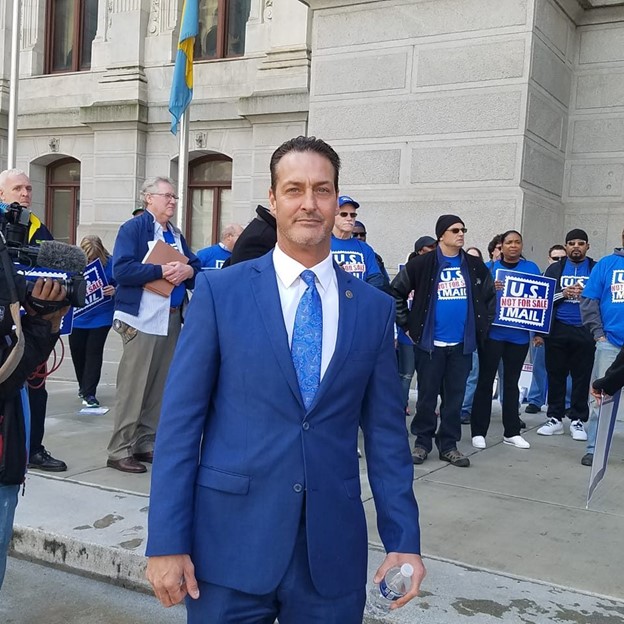KENSINGTON, Pa. – Kensington is only 6 miles north of Philadelphia’s city center but feels worlds apart. As you enter Kensington from Interstate 95, it looks just like any other suburb, but 2 miles away, the neighborhood turns darker as if entering a gloomy, damp underpass. That turning point happens on the corner of East Lehigh and Kensington Avenue and carries forward five to six blocks on both sides of the street. Dozens of men and women lie still on the pavement, dressed in worn-out clothes; others sit injecting themselves while still more people walk as if zombies, without a destination other than wherever their bodies take them. Some carry plastic bags with their few belongings, others wander aimlessly or lean their bodies against building walls as if these walls are their only friends helping them get to somewhere, which is nowhere. Bodies of people passed out or hunched over litter the way.
Jim Harrity, 51, is Philadelphia’s Councilman At-Large and is on the ballot as the Democratic Party nominee this November in the C Council election. He is not only a long-time Kensington resident but has also dealt with alcohol addiction for years. And he does not shy away from reminding his constituents that he is “the only openly recovered person on City Council.” There is no doubt that Jim brings a unique perspective to the challenges and time it takes to recover from drug addiction, especially when the addiction involves mixing opioids with xylazine. But Harrity is also a loud voice on how the recovery from these drugs has to be approached differently. “I try to explain to my colleagues that this is not like the drugs we were used to.” He has to keep reminding his colleagues at the council and his constituents that “the purpose of these drugs is to get as many people addicted to them and as fast as possible. There are no ‘ifs,’ ‘ands,’ or ‘buts.’”

People line the pavement at Kensington Avenue, Kensington, Philadelphia, PA [Credit: Emilia Maia]
According to Harrity, the current strategy to deal with this crisis is not working. Harrity advocates for a swift revamp of the city’s approach to curb this horrific crisis. The recovery from alcohol is hard, exhausting, and has no happy ending for far too many. But recovering from these drugs, opioids mixed with xylazine (known as “Trunk”), requires a whole new ball game. “We need to come to the realization that we are going to have to talk about long-term recovery. Where 30 to 90 days was okay for someone like me who was an alcoholic, it is not for these people suffering from this opioid crisis,” he says. Harrity explained that it takes at least 90 days for the drug to get out of a person’s system and then another month for them to realize and recognize their addiction. “These people need a least six months of a recovery program.”
Having wrestled personally with addiction strengthens Harrity’s voice in the city council when discussing approaches to and policies for finding effective solutions to this new epidemic. They called the opioid crisis “one of the most urgent public health challenges of our time.”
In September, Harrity voted to ban the creation of safe sites for drug addicts to inject, the latest attempt by Philadelphia to reduce overdose deaths. He believes the solution to this horrific problem is not to provide safe sites for drug users to inject and harm themselves but to create long-term recovery programs to get them out of the street and the addiction.
Drawing on his own experiences as a long-time resident in Kensington and person who recovered from addiction, Harrity believes he understands these people involved in the opioid crisis. He knows that when dealing with addiction, “while you have to show them love, you have to give them tough love.”
Harrity started in politics in his early 20s as a staffer working for many different Philadelphia city departments and elected officials. He also served as a campaign aide to the late state Senator Buddy Cianfrani and was executive director for the last four years in the Office of Democratic State Senator Shariff Street. He is also the political director of the Pennsylvania Democratic Party and serves on the board of the nonprofit One Day at a Time. He obtained a GED from the Community College of Philadelphia.
A few years back, Harrity put together a toolbox with wrenches, sockets, and other tools for the kids on his street to fix their bikes. To this day, he continues to leave it out for them to help themselves.
Despite all the challenges of moving legislation through the system, Harrity feels optimistic about the makeup of this new City Council. “We have a lot of caring people who want to do their jobs.” And he does not have to look very far from his neighborhood to see what needs to be done.
If you or a loved one are seeking help for drug addiction, samhsa.gov has resources and information that may help.
[Correction] We originally printed that Harrity is 59 years old; he is, in fact, presently 51 years old.


